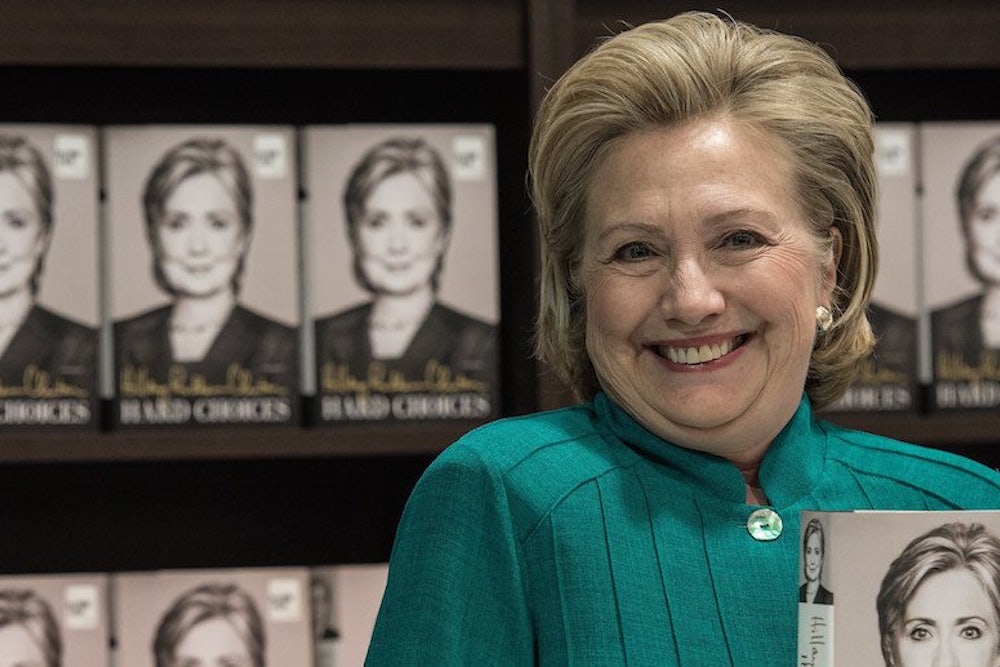On Thursday, Hillary Clinton will take a break from the campaign trail to testify before the House Committee on Benghazi, where she will face questions on topics from her private email server to the security at the Benghazi Compound. But long before Clinton received the summons—and a year before she launched her presidential campaign—Clinton wrote 34 pages explaining her involvement in the Benghazi attacks. In Hard Choices, Clinton’s memoir of her tenure as Secretary of State, she recounts the days surrounding the Benghazi attacks and confronts conspiracy theories that emerged in the aftermath of the attack, offering explanations for the State Departments actions and identifying where they might have gone wrong.
Although the book was published last July, her publisher Simon and Schuster has has now made the chapter free to read on Clinton’s website, and it may be the best window into the arguments she’ll advance on Capitol Hill Thursday. Hard Choices shows Clinton as she’d like to appear: heartbroken at the loss of American lives; resolute about her choices in the days after the attacks; and adamant that the United States simply cannot eliminate every threat to its foreign service if it hopes to retain its dominance on the global stage.
On the facts:
“The events of that September occurred in what is often called the 'fog of war,' with information hard to come by, and conflicting or incomplete reports making it difficult to tell what was actually happening on the ground, especially from thousands of miles away in Washington,” she writes. “There will never be perfect clarity on everything that happened.”
On whether the attack had been planned:
“There were scores of attackers that night, almost certainly with differing motives. It is inaccurate to state that every single one of them was influenced by this hateful video. It is equally inaccurate to state that none of them were. Both assertions defy not only the evidence but logic as well.”
On the lives lost:
“Far and away my greatest regret from those years is that not all of [those who serve our country] returned home safely. I often think about the families who lost loved ones serving our country. The gravity of the mission and the gratitude of our national may provide some solace, but in the end there is nothing any of use can say or do to fill the holes left behind.”
On taking responsibility:
“As Secretary of State, I was accountable for the safety of almost seventy thousand people at the Department and USAID and our more than 270 posts around the world. When something went wrong, as it did in Benghazi, it was my responsibility.”
On working from home:
“When I became Secretary the Department outfitted my house with all the secure communications and other equipment necessary to work as easily from there as I could from the office.”
On the politicization of the attacks:
“Those who exploit this tragedy over and over as a political tool minimize the sacrifice of those who served our country,” she writes. “I will not be a part of a political slugfest on the backs of dead Americans. It’s just plain wrong, and it’s unworthy of our great country.”
Clinton writes that she accepts that Congress should exercise oversight over the workings of the State Department, but “many of these same people are a broken record about unanswered questions. But there is a difference between unanswered questions and unlistened to answers.”
On whether she minimized the tragedy in Benghazi in previous Congressional testimony, when she said “Was it because of a protest or was it because of guys out for a walk one night and decided they’d go kill some Americans? What difference at this point does it make?”
“Nothing could be further from the truth,” Clinton writes. “My point was simple: If someone breaks into your home and takes your family hostage, how much time are you going to spend focused on how the intruder spent his day as opposed to how best to rescue your loved ones and then prevent it from happening again?”
